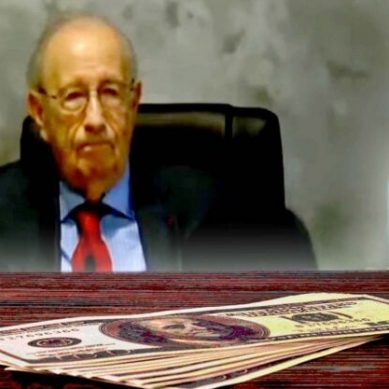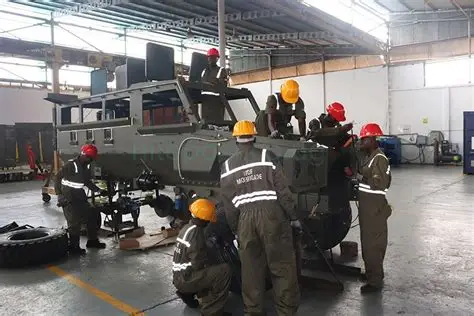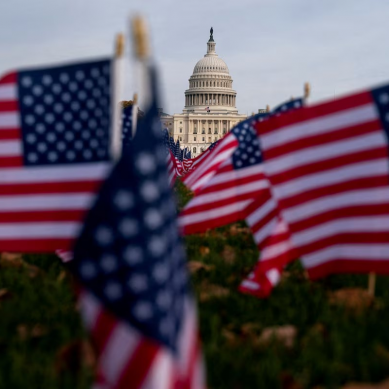
A dark SUV cruised past former President Donald Trump’s supporters near his Bedminster golf club in New Jersey on a windy April afternoon. Billowing from the vehicles were three flags: one for the Trump campaign, two others with the initials PB, the insignia of the far-right Proud Boys movement.
Through the open windows, three Proud Boys flashed the “OK” sign with their hands, a gesture often associated with white supremacy and the far right. Trump’s fans cheered. Four men dressed in the signature black-and-yellow shirts of the Proud Boys spilled out of the SUV and began glad-handing the crowd like homecoming heroes.
The Proud Boys are back. Four years after the failed effort to overturn Trump’s 2020 electoral defeat, the violent all-male extremist group that led the storming of Congress on January 6, 2021, is rebuilding and regaining strength as Trump campaigns to return to the White House, according to interviews with eight Proud Boys, two US law enforcement officials and four experts who track the group’s online activity.
Since the January 6 Capitol riot, four former Proud Boys leaders have been convicted in federal court of seditious conspiracy, each sentenced to 15 or more years in prison. At least another 70 members were charged with participating in the violence. But that crackdown hasn’t stopped the Proud Boys.
Some Proud Boys say they are preparing to emerge once again as a physical force for Trump, drawn to his hardline nationalism and convinced their leaders will be pardoned if he wins. Trump himself promises to pardon convicted January 6 rioters if he’s elected.
After last Thursday’s historic guilty verdict against Trump, an Ohio Proud Boys chapter vowed “war” and posted a video of Proud Boy street brawls that ended with the message, “Fighting solves everything.” A Miami chapter said, “Now, more than ever, we are recruiting!” Some posted images of the upside-down American flag symbolizing the “Stop the Steal” movement that falsely claims Trump won the 2020 election. One Proud Boy told Reuters that America is in a period of “calm before the storm.”
The group’s main Telegram channel, however, posted a message urging Proud Boys to stay calm and not get drawn into a trap and risk arrest. “Trump is, of course, getting railroaded but we will not be walking into any honey pots over this.”
In recent weeks, the group has become more prominent at pro-Trump events, highlighting the risk of renewed violence in this year’s presidential election.
Dozens of Proud Boys – some in body armour and helmets – marked the third anniversary of the January 6 insurrection with a show of force at the statehouse in Columbus, Ohio. On April 20, nearly a dozen gathered at a rally for Trump’s Republican campaign in Wilmington, North Carolina. More recently, groups of Proud Boys from two chapters mixed with tens of thousands of Trump supporters at a campaign rally in Wildwood, New Jersey, in May.
On a boardwalk near the entrance of the Wildwood rally, several Proud Boys identified themselves as members of the “New Jersey State” chapter. One said they were there to provide security and stop agitators from “disrespecting or assaulting everybody.” Inscribed on his wraparound sunglasses were the initials “POYB” – short for “Proud of Your Boy.” He wore a ring with the initials “PB” and a black shirt with the yellow laurel wreath of the Proud Boys. Three men from another chapter greeted them, their faces hidden by gaiter masks.
The re-emergence of the Proud Boys at Trump’s political rallies and events coincides with polls showing a majority of Americans fearing political violence will flare around November’s election. It also comes when Trump’s use of incendiary rhetoric is inspiring his supporters to target his opponents – including judges, prosecutors and political rivals – in a wave of threats that’s unprecedented in modern American politics.
Trump himself has not ruled out the possibility of political violence if he loses in November. “If we don’t win, you know, it depends,” he said when asked by Time magazine in April if he expected violence after the election. If he’s jailed or put under house arrest, “I’m not sure the public would stand for it,” he said in a Fox News interview that aired on Sunday. “At a certain point there’s a breaking point.”
Before the last election, Trump told the Proud Boys to “stand back and stand by.” Three months later, federal prosecutors say, the group’s leaders plotted and led the insurrection of the US Capitol. Trump’s baseless, rigged-election claims inspired the gathering, and Trump himself urged the assembled crowd to march on the Capitol as Congress certified Democrat Joe Biden’s victory.
A spokesperson for Trump did not respond to questions for this story about his rhetoric, January 6 and the Proud Boys.
As the Proud Boys regroup, they’ve made changes designed to make them less vulnerable to law enforcement scrutiny, including doing away with layers of top leadership, according to interviews with members. The Proud Boys now operate with self-governing chapters in more than 40 states, with little apparent central coordination, members said.
While the group’s structure has changed, its Canadian founder remains an inspirational figure to today’s Proud Boys. Gavin McInnes, a British-born far-right commentator who lives in New York, announced his resignation from the Proud Boys in 2018. But he remains deeply involved with the group, according to interviews with Proud Boys.
“When there are disputes, he mediates,” one Proud Boy said. J. Daniel Hull, a lawyer who has represented Proud Boys, agreed. “They’ll take a lot of cues from Gavin McInnes.”
Over three interviews with Reuters, McInnes said he is not seeking a leadership role but that he communicates regularly with members, makes an appearance at some events and tries to resolve infighting. Some Proud Boys affectionately refer to him as a “Godfather.”
After McInnes stepped down, his successor, Henry “Enrique” Tarrio, raised the Proud Boys’ profile, pulling them from the fringe of the far-right toward the center of Trump-era Republican politics. Tarrio, a Floridian of Afro-Cuban descent, was sentenced last September to 22 years in prison for seditious conspiracy, defined as an effort by two or more people to overthrow the government or use force to hinder its operations, and other charges related to the Capitol riot. He has appealed. Two criminal defense attorneys for Tarrio did not respond to emailed questions and phone calls.
In the past, McInnes, Tarrio and a group of leaders dubbed “Elders” spoke publicly on the group’s behalf, set the agenda and guided its confrontations with left-wing groups around the country. They sat atop a formal structure and could disband Proud Boy chapters or expel members. Now, members say, the chapters are largely independent of each other and ban communications with the media. Most members who spoke to Reuters for this report did so on condition of anonymity.
The group’s resilience has surprised some extremism experts. “The amazing thing is that so many people from the Proud Boys can be in jail and yet you have these active chapters,” said Heidi Beirich, co-founder of the nonprofit Global Project Against Hate and Extremism. “Traditionally when the head of a neo-Nazi or white supremacist group goes to jail or dies, the organisation will collapse, but that does not seem to be happening with the Proud Boys.”
The Federal Bureau of Investigation and the Department of Homeland Security declined to comment on the group’s activities and whether authorities are monitoring the Proud Boys.
A previously unreported 2022 Department of Homeland Security intelligence report, reviewed by Reuters, refers to “Domestic Violent Extremists” identifying themselves as Proud Boys who are “primarily engaged in violence against law enforcement and ideological opponents.” It’s not against the law to be a member and most Proud Boys haven’t done anything illegal, it added.
“You can be as big a Proud Boy supporter as you want in this country as long as you’re not planning criminal activity,” said former FBI agent Mark Seyler, who investigated the Proud Boys before retiring at the end of 2021. But, he added, after the Capitol riots, “there would be no excuse this time not to take them seriously.”
At Tarrio’s criminal trial, one Proud Boy described the group as ’’foot soldiers of the right.” Today, glorification of violence remains a core feature of the Proud Boys – as does unwavering support of Trump, according to interviews with current members.
The Proud Boys describe their ideology as “Western chauvinism,” which they say is a deep embrace of Western civilisation and traditions. Critics say the group uses the term “Western” rather than “white” to veil its racism – a charge the Proud Boys’ defenders deny. While the Proud Boys claim the group is a fraternal organisation, in practice it promotes street violence against the left and trolls liberals, Democrats, feminists, transgender activists and others they oppose.
A handbook outlining Proud Boys rituals was revealed by prosecutors in 2023 as evidence in Tarrio’s trial. The manual says that becoming a high-ranking Proud Boy requires “engaging in a major conflict,” including “serious physical fights” or “getting arrested.” A defence lawyer in the case argued that some of the document was merely sarcastic and politically incorrect.
In the 2023 trial of Proud Boys convicted of seditious conspiracy, federal prosecutors produced evidence of a recruiting manual detailing steps required for initiates to be promoted to the four ascending levels of Proud Boy membership. The highest, or Fourth Degree, required physical violence, according to the handbook.
A “Proud Boy Prayer” on an active website promoting a New Jersey chapter of the group puts it this way: “Strengthen us Brothers with power and hard fists to help us defend the right and defeat the wrong.” The same site says the Proud Boys don’t support acts that violate criminal law.
Federal prosecutors and a US congressional investigation both named the Proud Boys as crucial plotters and leaders of the January 6 attack. The Proud Boys “lined up behind Donald Trump” and were “ready to commit violence on his behalf,” Assistant US Attorney Conor Mulroe said in court. “These defendants saw themselves as Donald Trump’s army, fighting to keep their preferred leader in power no matter what the law or the courts had to say about it.”
Publicly, members of the group deny the Proud Boys orchestrated the January 6 violence. Instead, they characterize the riot as spontaneous and their leaders as innocent. Privately, however, some Proud Boys acknowledge that the group drove the events of that day.
“Without the Proud Boys, January 6 didn’t happen,” one longtime member of the group told Reuters. “The Proud Boys were the tip of the spear.”
Federal prosecutors and a US congressional investigation have both named the Proud Boys as crucial plotters and leaders of the January 6, 2021, attack on the US Capitol. REUTERS/Leah Millis
During the Trump administration, the Proud Boys engaged in large-scale street brawls with antifa – antifascists – and other leftist groups across the country, typically by taunting demonstrators to instigate a fight. They adopted the slogan “Fuck Around And Find Out,” and emblazoned the letters “FAFO” on hats and t-shirts.
Some historians compare the Proud Boys to fascist European militias of the 1920s and 1930s such as the Brownshirts, a Nazi paramilitary group that helped bring Hitler to power in Germany. Proud Boys say they’re nothing like the Brownshirts and bear no resemblance to fascists. But street violence and extreme nationalism are features of both groups. In the weeks before the Capitol riots, some wore a patch inscribed with “RWDS,” short for “Right Wing Death Squad,” a term used to describe Central and South American paramilitaries who supported right-wing governments and dictatorships.
After Trump left the White House, the Proud Boys turned to America’s culture wars. They clashed with supporters of abortion rights and vaccine mandates, and harassed organizers of Drag Queen Story Hours, where female impersonators read at libraries or bookstores to children. Fights often ensued.
Since the 2021 Capitol attack, Reuters identified 29 incidents of political violence involving the Proud Boys, almost all of them centered around social issues. All but one of the eight cases in 2023 involved clashes between Proud Boys and left-wing activists at demonstrations supporting LGBTQ+ rights. The tally was based largely on news reports and court records of fights, assaults and other physical confrontations.
This year, the Proud Boys have returned to politics.
In the first three months of 2024, there have been far fewer Proud Boys public events than in the same period last year. But half of them have been pro-Trump and the rest have been political in nature, related to guns or immigration, said Keiran Doyle of the Armed Conflict Location & Event Data Project, a US-based nonprofit that monitors political violence.
On April 24, Proud Boys founder McInnes appeared at Columbia University’s pro-Palestinian protests. He told Reuters that the Proud Boys were not getting involved in the anti-Israel unrest, saying he was there to “ridicule” liberals by pretending to be a left-wing journalist. It didn’t work, he said, because people saw him and posted alerts on social media. “They recognized me and were scared.”
There’s no authoritative count of Proud Boy members. McInnes claims there are about 5,000, down from 8,000 during Trump’s presidency but up from lows after the Capitol riot arrests. Official estimates of the Proud Boys’ strength vary widely, from 300 to 3,000 members, said a law enforcement source who has monitored the group. Reuters could not independently corroborate its numbers.
- A Reuters report







